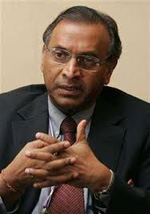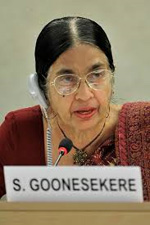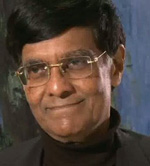Sunday Times 2
Progress is coming by way of participatory democracy
Although governance in Sri Lanka in the past decade has been both difficult and challenging for both the administrators and citizens, it has also left us with many lessons to reflect on. Today the country’s democratic space is more vibrant than it has been in a long time; with free media, active political debates on television and uninterrupted social movements on social media, the democratisation process is in full swing.

Jayantha Dhanapala
However, this is not to say that there have not been obstacles to the process of democratisation in the 100-day programme and the government’s democratic agenda. One could argue that this new found media freedom has also created a platform for the opposition to express its views. However, as we have learned from the past, disrupting the freedom of expression — no matter how damaging or misleading it may be due to the actions of those with conflicting political agendas — can have an adverse effect on both the citizens and the Government. In such a setting, it is the Government’s obligation to transparently communicate its agenda and democratisation mechanisms to the public, to ensure that the people are not misled.
Last week the Presidential Secretariat held a panel discussion and briefing on the 19th Amendment to the diplomatic community of Sri Lanka. The event addressed a key shortcoming that Sri Lanka had neglected in the past years: the Government’s obligation to communicate its work to the international community. Sri Lanka has had a history of keeping its diplomatic community in the dark when it comes to government decisions, especially those with regard to constitutional reforms. For instance, when the 18th Amendment was adopted very little was done to allow civil society to participate in the process and to keep the international community informed.
Last week’s event included a panel discussion by three of Sri Lanka’s finest academics and professionals: Dr. Jayantha Dhanapala, who made the keynote speech, Sri Lanka’s first female Vice Chancellor Prof. Savitri Gooneskere and Nobel Prize Laureate Prof. Mohan Munasinghe. The panellists had the freedom to express their perspectives on the amendment without bias. The audience, which included Presidential Secretary P.B Abeykoon, foreign diplomats, UN officials and country representatives of international organisations, posed questions to the panel, generating a productive discussion on constitutional reforms and constitution making.

Savitri Gooneskere
Dr. Dhanapala’s view was that the adoption of the 19th Amendment, “although not fully satisfying” the demand of abolishing the authoritarian Executive Presidential system has, to a large extent, repaired the democracy deficit in Sri Lanka. He articulated how the amendment had played a key role in restoring the international community’s faith in Sri Lanka as a democracy. He drew reference to a statement made by UN Human Rights Commissioner Zeid Ra’ad Al Hussein at the 29th session of the Human Rights Council this month. The UN Human Rights Chief said: “The new Government in Sri Lanka has passed a Constitutional Amendment if implemented appropriately brings renewed hope for democracy and the rule of law.” With the UNHRC scheduled to receive the external investigation report at the next Geneva session in September, these remarks by Zeid Ra’ah Al Hussein are invaluable to Sri Lanka.
Prof. Munasinghe presented a scientific analysis of the 19th Amendment’s relationship to Sri Lanka’s sustainable human development goals. He explained that the 100-day programme and the 19th Amendment maintained a drive towards restoring democracy, which is a fundamental requirement for sustainable human development. He stated that “much has been achieved in spite of the many blocks in parliament and elsewhere.”
“Key steps have been taken towards a sustainable human development vision, and there is more to come, I promise you. Although I’m not a spokesperson for the government, I’m confident (together with my colleagues) that this will happen,” he assured.
Prof. Goonesekere, had much constructive criticism of the way the constitutional reform process was conducted. She explained that it is extremely distressing that an opportunity for democracy had to be negotiated in a process that undermined some of the opportunities for constitution making.
She described this as “a collective sense of amnesia” that we Sri Lankans share, a trait that makes us quick to forget the tragedy of democratic deficit of the past. Having said that, she mentioned, she also recognises the difficulties of conducting a truly efficient process of constitutional reform due to “the adversarial political environment” prevailing in the country.

Mohan Munasinghe
She noted that the 19th Amendment marks the first time in Sri Lanka’s history moves to introduce many concepts fundamental for democratisation. One of the provisions of the 19th Amendment states that the Constitutional Council must appoint people by taking into account the pluralistic character of Sri Lankan society, including gender; the first time gender has been included in a Sri Lankan constitutional guideline. The guidelines for the Council also include a reference to incorporating the standards set internationally on preventing corruption. Again, the first time the Sri Lankan constitution refers to the need to abide by international standards and international conventions. Pointing out to post-conflict success stories such as South Africa, Prof. Goonessekera said that it is vital that Sri Lanka calls for new constitution making, “integrating the best of national norms with the international.” She further added that she hopes that the country’s political parties will present the citizens with an agenda of complete constitutional reform.
The audience, too, had a insightful views and questions for the panel. Subinay Nandi, Resident Representative of the United Nations Development Programme, said the panel discussion was a refreshing change and gave him much insight into the history that is currently being made in Sri Lanka during this period of transition. He asked Dr. Dhanapala how the Government could ensure that reconciliation process would be done differently; not in a bureaucratic way but in a participatory way, engaging people for whom it matters? In response, Dr. Dhanapala referred to the truth seeking mechanisms going on through the existing Paranagama Commision, where an interim report has already been published and the rest of the work is being completed with the help of the ICRC. He also added that a domestic mechanism is being set up, in consultation with domestic and international experts. Dr. Dhanapala also made a reference to the fact that the governors of the Northern and Eastern Provinces are now civilians and veteran administrators. This itself is a significant change from the past, he said.
For post-armed conflict nations such as Sri Lanka to experience sustainable peace and democratic governance, all forms of political reforms must be carried out in a participatory way. This has not been the experience of the past. Sri Lanka has a history of excluding the public and the international community in the government’s decision making process. Inclusivity of civil society is a fundamental requirement of post-war democratisation. With this discussion, the Government has shown its interest in hearing out the opinions, including criticism of professionals and academics of Sri Lanka, who are representatives of civil society, in key government decision making processes. What this briefing signifies is not just a mere conveyance of the Government’s agenda to the diplomatic community. It is a reminder of the need for the Government’s transparency and that good communication within all parties could make the system more democratically efficient and functional: a clear sign that progress is coming, guns blazing.
(Thisuri Wanniarachchi, 21, is the author of novels The Terrorist’s Daughter and Colombo Streets. She is Sri Lanka’s youngest State Literary Award winner and the world’s youngest national nominee to the Iowa International Writers’ Program. She is currently a Political Economy and Education Reform undergraduate student of Bennington College and an intern at the Presidential Secretariat.)

